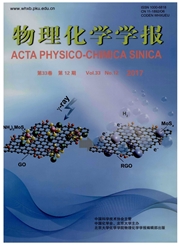

 中文摘要:
中文摘要:
通过探讨氧化钛纳米线阵列反应机制,建立了在水热条件下,氧化钛纳米线阵列在亲水掺铟氧化锡表面上由极性/非极性溶剂体系中形成的胶束内反应并生长的模型.并由此利用微胶束的尺寸限制作用,通过温度对微胶束尺寸进行调节,以及Cl–离子的晶面限制效应,实现了在较大范围内对纳米线直径的调控.另外反应体系中极性与非极性溶液的比例的变化对纳米阵列的直径影响不大,因此可以认为在此反应体系中,氧化钛纳米线的直径主要受到微胶束的限域效应以及Cl–离子的晶面限制效应影响.此方法可应用于其他相关氧化物纳米材料的尺寸控制合成中.
 英文摘要:
英文摘要:
We establish a model for growing titania nanowires arrays(TNAs) within micelles on the hydrophilic substrate of fluorine-doped tin oxide(FTO) in a reversed micelle reaction under hydrothermal conditions, and we discuss the mechanism that micelle size controlled the diameter in the TNAs growth progress. We produced TNAs with various diameters on FTO by adjusting the temperature, which changed the micelle size, and by using the crystal-plane suppressing effect of the Cl– ion. The volume ratio of the polar/nonpolar solvent barely influenced the nanowire diameter during growth. Based on this result, thinner TNAs can be prepared by using the restricting effect of the micelles and the crystal-plane suppressing effect of the Cl– ion. This method can also be used to synthesize other relative oxide nanomaterials.
 同期刊论文项目
同期刊论文项目
 同项目期刊论文
同项目期刊论文
 期刊信息
期刊信息
